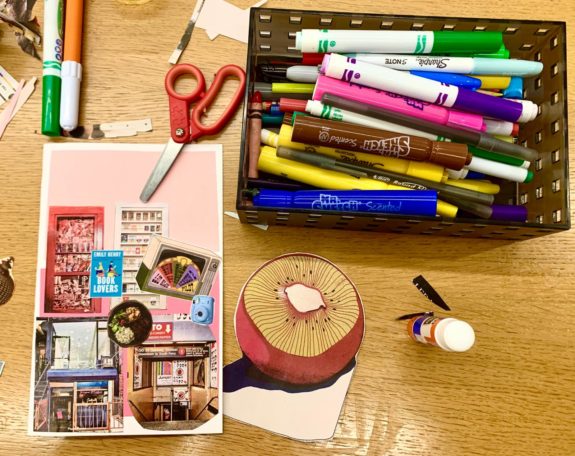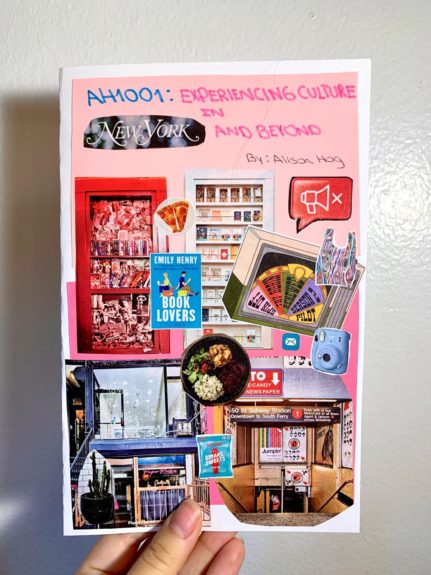To celebrate Leap Day, Managing Editor Alison Hog attended a syllabus zine making workshop at the Barnard Zine Library, discovering that learning never ends.
Without the structure that higher-education institutions provide with their wide selection of courses, materials, and admittedly often tedious assignments, the question remains: How can we keep our intellectual curiosity alive and thriving? How do we avoid getting too caught up with our new life after graduation and all the responsibilities it entails? Sure, we might still have that spark in us, that inquisitiveness that prompted us to apply here in the first place and that pushed us forward until the end of the journey. But, as adults tend to warn us, life after college is a beast of its own, and we’ll no longer be insulated from the ”real world.” Having to juggle full-time jobs and tax return filings, how can we keep ourselves accountable? They say humans are lifelong learners, and though I do believe in the truthiness of those words, when we are left on our own it can be harder to actively do so.
Alex Prezeau (BC ’24), the creator and host of this workshop, reimagined continuous learning in a world where education won’t be our primary focus anymore, bringing together two seemingly different items to do so: syllabi and zines. This Thursday evening, the Barnard Zine Library and the Center for Engaged Pedagogy (CEP) co-hosted the workshop “DIY Syllabi as Gifts” as part of the Library’s Zine Making series.
For Prezeau, this ingenious idea stemmed from her own experience as a graduating senior. “How can I keep learning after graduating?” she wondered. Her desire to keep the spirit of learning alive while being able to exchange interests and knowledge among her community of friends led her to consider the usefulness of syllabi, with a twist: art. After guiding us through the range of possibilities we could try—walking us through her “Experimental Archaeology” syllabus zine as an example—and elements to include—learning objectives, a course schedule, an honor code—she encouraged us to create something through which our personality and passions could shine. “Truly anything you want,” Prezeau emphasized. Equipped with inspiration, Tracy Chapman’s melodic tunes in the background, and delicious H-Mart snacks to energize us, we dove into our craft-making.
I have never been the artistic type, at least when it comes to visual arts, so seeing everyone rummage through the magazines and get all hands-on immediately made me self-doubt my already lacking abilities. “I’ve never done a Zine before. I’m a little lost,” I admitted. “What can we do to unlose you?” Jenna Freedman, Director of the Barnard Zine Library, asked me in response. She proceeded to explain to me how zine making has an “anti-perfection element to it,” which may come harder to people who think through every step taken in hopes of reaching a flawless delivery. Zine making, on the contrary, requires spontaneity, passion, and freedom. It requires blindly trusting the often messy, but highly satisfying creative process. Freedman was right. The second I stopped striving for perfection and let loose, it all started coming easier to me.
With Freedman’s advice in mind, I embarked on the mission to create a syllabus zine that I could look back to for the rest of my time here. New York has long been known as the melting pot of the world, with different cultures colliding and blending under the blinding city lights. With such cultural vibrancy, I decided my zine would focus on the study of the city and everything it has to offer—actively learning inside and outside the classroom. As such, my imaginary class took the name of “Experiencing Culture in New York and Beyond,” featuring recommended cultural destinations in New York, something we are not short of with the impressiveness of our museums and other institutions; intercultural festivities in all boroughs, from the Momo Crawl in Jackson Heights to Chinatown’s Lunar New Year Parade; sociological research studies and theories; literature from other fields like history and anthropology; and more. Assignments would include readings to understand New York’s unique cultural position through time, but also activities encouraging the student to explore this city steeped in culture and traditions and all its dimensions.
To build the cover of my zine, I had access to a wide range of materials provided by the library—magazines, a 1970s Barnard yearbook, newspaper clippings, markers, and cardboard papers of all colors. Looking at the possibilities, it felt like I could turn anything I envisioned into reality. I cut, pasted, and arranged a design, something I had not done since middle school. I also pondered, researched, and wrote.
Striking the perfect blend of all worlds, I unleashed my intellectual curiosity and creative potential during this lovely evening of community, learning, and craft-making. And, before I even knew it, the workshop was already over. I looked at my creation and smiled. It was not a masterpiece, but it was my piece, and on this extra day of the year, I felt proud to have tried something new.
I have never been the artistic type. But maybe I don’t need to be, and zine making is my newfound hobby.

Zine making process 
Final product
The Barnard Zine Library and CEP are co-hosting the next session for their “DIY Syllabi as Gifts” workshop series on April 19, 2024. You can register here.
For more information about the Barnard Zine Library and upcoming events, check out their website.
Images via Author


 1 Comments
1 Comments
1 Comment
@Anonymous This is such a lovely article!